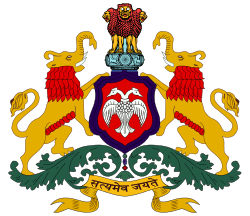Jaya Bharata Jananiya Tanujate
| English: ja | |
|---|---|
| ಜಯ ಭಾರತ ಜನನಿಯ ತನುಜಾತೆ | |
|
Emblem of Karnataka | |
|
state anthem of Karnataka (de facto) | |
| Lyrics | Kuvempu |
| Music | Mysore Ananthaswamy |
| Adopted | 2004 |
Jaya Bharata Jananiya Tanujate (Kannada: ಜಯ ಭಾರತ ಜನನಿಯ ತನುಜಾತೆ) is a Kannada poem, which was composed by the Indian Kannadiga poet Kuvempu. The poem was officially declared the state anthem of the Indian state of Karnataka on January 6, 2004.[1]
The poem envisages a Karnataka that recognises its position in the comity of Indian states, believes in peaceful co-existence with her sisters, but at the same time maintains her self-respect and dignity from a position of confidence and strength rather than insecurity and fear.
Kannada version(Official)
The official version of the song is as follows:
ಜಯ ಭಾರತ ಜನನಿಯ ತನುಜಾತೆ,
ಜಯ ಹೇ ಕರ್ನಾಟಕ ಮಾತೆ!
ಜಯ ಸುಂದರ ನದಿ ವನಗಳ ನಾಡೇ,
ಜಯ ಹೇ ರಸಋಷಿಗಳ ಬೀಡೆ!
ಜಯ ಭಾರತ ಜನನಿಯ ತನುಜಾತೆ,
ಜಯ ಹೇ ಕರ್ನಾಟಕ ಮಾತೆ!
ಜನನಿಯ ಜೋಗುಳ ವೇದದ ಘೋಷ,
ಜನನಿಗೆ ಜೀವವು ನಿನ್ನಾವೇಶ!
ಹಸುರಿನ ಗಿರಿಗಳ ಸಾಲೇ,
ನಿನ್ನಯ ಕೊರಳಿನ ಮಾಲೆ!
ಕಪಿಲ ಪತಂಜಲ ಗೌತಮ ಜಿನನುತ,
ಭಾರತ ಜನನಿಯ ತನುಜಾತೆ!
ಜಯ ಹೇ ಕರ್ನಾಟಕ ಮಾತೆ!
ಶಂಕರ ರಾಮಾನುಜ ವಿದ್ಯಾರಣ್ಯ,
ಬಸವೇಶ್ವರ ಮಧ್ವರ ದಿವ್ಯಾರಣ್ಯ!
ರನ್ನ ಷಡಕ್ಷರಿ ಪೊನ್ನ,
ಪಂಪ ಲಕುಮಿಪತಿ ಜನ್ನ!
ಕುಮಾರವ್ಯಾಸರ ಮಂಗಳಧಾಮ!
ಕವಿಕೋಗಿಲೆಗಳ ಪುಣ್ಯಾರಾಮ!
ನಾನಕ ರಮಾನಂದ ಕಬೀರರ,
ಭಾರತ ಜನನಿಯ ತನುಜಾತೆ!
ಜಯ ಹೇ ಕರ್ನಾಟಕ ಮಾತೆ!
ತೈಲಪ ಹೊಯ್ಸಳರಾಳಿದ ನಾಡೆ,
ಡಂಕಣ ಜಕಣರ ನೆಚ್ಚಿನ ಬೀಡೆ!
ಕೃಷ್ಣ ಶರಾವತಿ ತುಂಗಾ,
ಕಾವೇರಿಯ ವರ ರಂಗ,
ಚೈತನ್ಯ ಪರಮಹಂಸ ವಿವೇಕರ
ಭಾರತ ಜನನಿಯ ತನುಜಾತೆ!
ಜಯ ಹೇ ಕರ್ನಾಟಕ ಮಾತೆ!
ಸರ್ವಜನಾಂಗದ ಶಾಂತಿಯ ತೋಟ,
ರಸಿಕರ ಕಂಗಳ ಸೆಳೆಯುವ ನೋಟ!
ಹಿಂದೂ ಕ್ರೈಸ್ತ ಮುಸಲ್ಮಾನ,
ಪಾರಸಿಕ ಜೈನರುದ್ಯಾನ
ಜನಕನ ಹೋಲುವ ದೊರೆಗಳ ಧಾಮ,
ಗಾಯಕ ವೈಣಿಕರಾರಾಮ.
ಕನ್ನಡ ನುಡಿ ಕುಣಿದಾಡುವ ಗೇಹ!
ಕನ್ನಡ ತಾಯಿಯ ಮಕ್ಕಳ ದೇಹ!
ಭಾರತ ಜನನಿಯ ತನುಜಾತೆ,
ಜಯ ಹೇ ಕರ್ನಾಟಕ ಮಾತೆ!
ಜಯ ಸುಂದರ ನದಿ ವನಗಳ ನಾಡೆ,
ಜಯ ಹೇ ರಸಋಷಿಗಳ ಬೀಡೆ!
English translation
Victory to you Mother Karnataka, the daughter of Mother India! Hail the land of beautiful rivers and forests, hail the abode of saints! You are a new jewel in the crown of Goddess Earth, mine of beautiful gold and sandal. Victory to you Mother Karnataka the daughter of Mother India where Rama and Krishna had their incarnations.
Resonance of the Vedas is your Mother’s lullaby for you, and your fervor is Her life. Rows of green mountains are your necklaces. Victory to you Mother Karnataka, the daughter of Mother India who is hailed by Kapila, Patañjali, Gautama and Jina.
You are a sacred forest where Shankara, Ramanuja, Vidyaranya, Basaveswara and Madhva dwelt. You are the holy abode where Ranna, Shadakshari, Ponna, Pampa, Lakshmisa and Janna were born. You are the blessed resting place of many a poet-nightingales. Victory to Mother Karnataka, the daughter of Mother India the progenitor of Nanak, Ramananda and Kabir.
This is the land ruled (in the past) by Tailapa and Hoysalas, and affectionate hometown for Dankana and Jakkana. This land is the blessed stage for Krishna, Sharavathi, Tunga and Kaveri. Victory to you Mother Karnataka, the daughter of Mother India of Chaitanya, Paramahamsa and Swami Vivekananda.
Garden of peace for all communities, a sight that allures the connoisseurs, the garden where the Hindus, Christians, Muslims, Parsis and the Jains (grow); the palace of many kings that are like Janaka; the place for singers and musicians; the body of the children of Mother Kannada—the house where Kannada Tongue plays in joy. Victory to you Mother Karnataka, the daughter of Mother India. Hail the land of beautiful rivers and forests, hail the abode of rasarishis!
Styles
The poem is set to tune by a number of Kannada composers, among which two tunes set by C.Ashwath and Mysore Ananthaswamy are the most popular ones. Recently there were some confusions and differences in opinion as to which tune should be used in rendition. The Prof. Shivarudrappa Committee, which was asked to suggest a befitting tune for the rendition of the song, had recommended that the music composed by Mysore Ananthaswamy was apt.
The Deputy Chief Minister of Karnataka, has asked Kannada University to create a uniform rendering for the anthem.[2]
See also
References
- ↑ Poem declared State Song The Hindu - January 11, 2006
- ↑ Evolve a uniform format for State anthem: Prakash The Hindu - September 7, 2005
